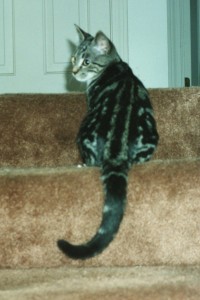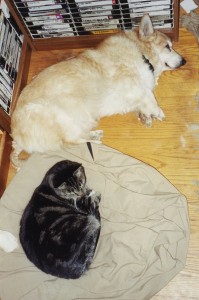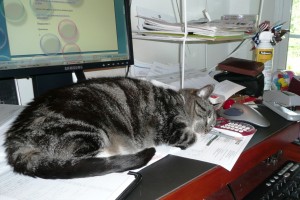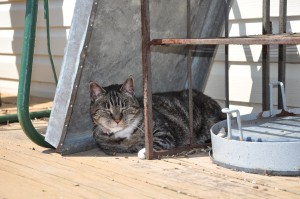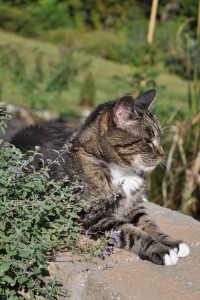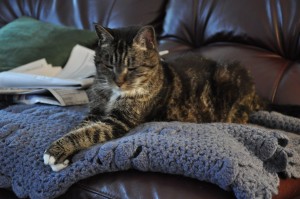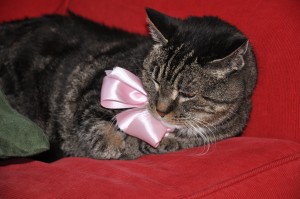When I was about twelve or thirteen, I read Sterling North’s Rascal, a memoir of a year during World War One and the raising of a baby raccoon. North was much the youngest of four siblings; his sister Theodora was the practical member of the family and the one who stood in for their mother, who had died.
Theodora’s full name was “Theodora Maud,” the Maud, as North points out, for the Maud of the poet Alfred, Lord Tennyson. This is what I read:
Come into the garden, Maud,
For the black bat, Night, has flown,
Come into the garden, Maud,
I am here at the gate alone;
And the woodbine spices are wafted abroad,
And the musk of the roses blown.
It’s a long love poem and these lines but the first verse. I memorized the lines, though, and loved the way the words wrapped around me like some dark, fragrant summer wind.
Theodora Maud was the name we gave that tiny brown tabby kitten in 1994.
We adopted her from the animal shelter near our apartment in Merrimack, New Hampshire. Expanding our family required considerable paperwork and bringing our dog, Morgan the Corgi, in for a supervised introduction. We followed the rules and followed instructions. Morgan poked the kitten once with his nose, turned to the cluster of shelter workers and seemed to say, “Oh, a kitten, that’s nice, now pat me, play with me, focus on me!” The kitten seemed disdainful. “It’s a dog…I should care because?”
The staff repeated the exercise with identical results. Having established that the dog would not eat the kitten or engage in other inappropriate behavior, we signed on the dotted line, scooped up this new member of the household and headed home.
Morgan and Theo discovered they liked each other. They played hide-and-seek, ripping apart the dust ruffle on my bed and shredding the hems of dresses in my closet. (I did learn to shut those doors but not until after substantial losses.) When Theo was bigger (and spayed), she’d spend time on the deck outside. One day I thought I saw her following at a distance as Morgan and I took our necessary walk. She was indeed following: lurking in flowerbeds or under shrubs and then darting to the next source of cover. It became a ritual.
Theo loved her first Christmas. My Tattooed Boy (whose skin was then still untouched), Morgan and I drove to Ma’s in Acton, just a hop over the Massachusetts line, for Christmas. We were gone not quite twenty-four hours. On our return, we found our Christmas tree sprawled on its side, carpet sodden with water, and the star and one or two other ornaments shattered. We stood there gaping at the damage; Theo purred “Merry Christmas.”
When we moved back to Maryland, she settled into the new digs with ease. Nothing changed: her food was still served on top of the Morgan’s crate so that he couldn’t get at it; she clawed things she wasn’t supposed to and ignored the scratching posts and toys provided; she hunted birds and baby rabbits (much to our dismay). She developed a certain talkativeness, not a Siamese yowl but more of a “meh” that was part purr, part chirp.
Suns rose and set, the earth continued to circle the sun.
A few years ago we moved across town to a new house, one backed up against a patch of woods and “non-tidal wetland.” Theo was kept indoors for a while until she seemed acclimated, satisfied with the location of her kibble and kitty litter. Finally, one warm August morning, we allowed her out the back door. She looked around cautiously but seemed contented to stay near the house. Awhile later I went to check on her and did not see her. Awhile after that I went looking for her and found her nowhere. Awhile after that I started to panic and searched everywhere from perimeter of house to perimeter of property calling her name. I thought she was simply gone.
Then I heard it. A meow, not loud but audible. I walked in the direction I thought the meow came from—although monaural hearing means I have about zero sense of what direction sound comes from. The meows did, however, seem to be getting louder; they certainly were becoming more insistent.
At the bottom of the slope, at the edge of the woods, was a thicket of overgrown grasses and brush along the silt fence installed when construction began on this part of the development. I knew she was near but her brown stripes were camouflage. At last she moved into view, complaining vigorously about my failures, her discomforts, her displeasure with the situation. I tried to coax her into walking back to me but she preferred I breach the wall of growth, clamber over the siltfence and come pick her up.
As Theo aged—and as landscaping improved around the house—she found favorite spots: the cool mulch under the boxwood hedges in the front, a wall in the back where I had planted a stand of catmint. She noted the presence of birds, squirrels and other small critters but chasing them became less interesting and eventually not possible.
Arthritis made her wobbly but she still came upstairs from her lair in the basement to sit with us on the couch and watch television. She insisted on her blankie of course—an afghan I crocheted eons ago and kept around as a throw. She liked it folded neatly and place on the center cushion of the sofa.
Eventually getting up and down the stairs grew to be an insurmountable challenge. I conferred with the vet; was Theo really okay? She continued to eat, poop and purr, I said. Then things were probably fine, the vet said.
And Theo was still chatty. She harrumphed a welcome each time I came down, reminded me to fill her dish. Occasionally she just wailed an existential “Whyyyyy.”
Over this past week, though, things stopped being fine, or even okay. Theo would have been twenty in April; at least we think so, for we never really knew. But now she has gone to the garden for good.
And her voice is silent.

